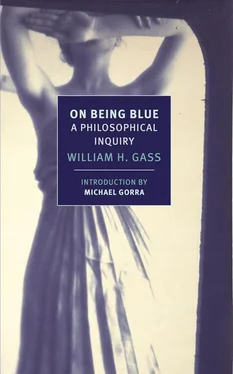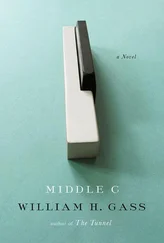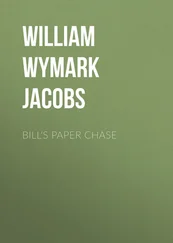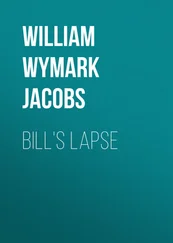Yet working blue isn’t an end in itself, not in this room. Gass’s language in this “philosophical inquiry” is notably freer than that in the fiction he had published in the sixties, the novel Omensetter’s Luck (1966) and the stories collected in In the Heart of the Heart of the Country (1968). Written English in those few intervening years had grown ever closer to the spoken tongue; certain “scrupulosities” no longer needed to be observed, and Gass was quick to allow himself a few liberties. Here, for example, is the first sentence of this book’s third chapter: “When, with an expression so ill-bred as to be fatherless, I enjoin a small offensive fellow to ‘fuck a duck,’ I don’t mean he should.” It’s true that having once said it Gass can’t resist imagining what it would be like if he did mean it, and yet most such expletives are neither literally nor consciously intended. The words may have been used but the speaker has inevitably “ignored their content,” and in that sense they haven’t really been used at all. They have merely “appeared,” and in consequence our freedom to use them in print has produced no “improvement in our life, thought, or writing… because [that] appearance is as unmeant and hypocritical as [their] former absence.” Nor is it much better when the blue is consciously chosen and inventively worked. Nipples may be said to resemble the ripest of raspberries or perhaps even a thimble, but “why take the trouble when the trouble taken is so evident,” though Gass himself is willing to do it and make it look effortless. Maybe they really look like “the lightly chewed ends of large pencil erasers,” and for someone who spends his days at his desk that image can prove surprisingly effective.
Working blue provides an especially vivid instance of the way words operate, with erotica’s clichéd call-and-response serving to illustrate the formulae within which any linguistic system is mired. Yet where other theorists of his day take a mingy delight in what Fredric Jameson called “the prison house of language,” Gass himself refuses to accept the idea even as he recognizes its force. Criticism may often stand as a kind of literature, but the knowledge it offers rarely has the power of art. On Being Blue seems to me an exception, and in time Gass will probably be remembered as much for it, or for the essays collected in such books as Habitations of the Word (1985) or A Temple of Texts (2006), as he will for his fiction. Few American novelists have written so barbed and sensuous a prose, and yet his own rumpled brain has always seemed to me more consistently interesting than any narrative situation or character he has yet contrived. Nevertheless it’s the fact or rather the existence of the fiction, of such grandly conceived books as The Tunnel (1995), that gives his criticism its life — it’s the novelist in him that makes him want to break out of jail. Gass’s essays rarely pursue a single line of thought, and they offer not a progression of ideas so much as an experience, all feints and nuance, and with the argument itself vanishing within the sportive accretions of his prose. But then that play of mind is itself the argument, and where the theorist believes that language can cripple, the novelist knows that it may set you free.
Gass’s erotic attention finally rests, therefore, on the bluest thing of all, “not what the tongue touches, but what it forms, not lips and nipples, but nouns and verbs.” Words caress, they glide their fingers down the spine and breathe between the toes, and “If any of us were as well taken care of as the sentences of Henry James, we’d never long for another, never wander away: where else would we receive such constant attention, our thoughts anticipated, our feelings understood?” That’s a dirty one, that sentence, though its beauty would vanish if I tried to tell you why. It means what it says and about eight other things too, and that perhaps is the final point of being blue. Joseph Conrad once complained that “no English word has clean edges.” The language had too many synonyms, words that approximated each other and yet were never quite identical, and with each finely shaded meaning carrying so many connotations as to make those words little more than “instruments for exciting blurred emotions.” Still, Conrad must have liked that imprecision, for he chose despite himself to work in English and not the cut crystal of French. Yet let me have a pun once more. Our words are not so much blurred as blued and bent, a bit less than they should be, and a bit more because of it, vehicles of the unintended.
Meaning is ever labile, as Pastoureau’s account of the rainbow suggests, but however much one may bleed into another our words have each their own unduplicated specificity. Blue is many things for Gass, and his account of it will make him speculate about the way children distinguish shape from size from color, it will take him back to Democritus and forward to Edwin H. Land, and lead him on to comparisons of Rilke and Rodin, Pollock and Picasso. And as you read down his roster of “damson, madder, and cadet,” of slate and steel and gentian, you will realize that this rhapsode has made blue into something like life itself. Or no. For we should rather surrender “the blue things of this world in favor of the words which say them,” the words and syllables and sounds that may shelter us in a time when “everything is gray.”
— MICHAEL GORRA
BLUE pencils, blue noses, blue movies, laws, blue legs and stockings, the language of birds, bees, and flowers as sung by longshoremen, that lead-like look the skin has when affected by cold, contusion, sickness, fear; the rotten rum or gin they call blue ruin and the blue devils of its delirium; Russian cats and oysters, a withheld or imprisoned breath, the blue they say that diamonds have, deep holes in the ocean and the blazers which English athletes earn that gentlemen may wear; afflictions of the spirit — dumps, mopes, Mondays — all that’s dismal — low-down gloomy music, Nova Scotians, cyanosis, hair rinse, bluing, bleach; the rare blue dahlia like that blue moon shrewd things happen only once in, or the call for trumps in whist (but who remembers whist or what the death of unplayed games is like?), and correspondingly the flag, Blue Peter, which is our signal for getting under way; a swift pitch, Confederate money, the shaded slopes of clouds and mountains, and so the constantly increasing absentness of Heaven ( ins Blaue hinein, the Germans say), consequently the color of everything that’s empty: blue bottles, bank accounts, and compliments, for instance, or, when the sky’s turned turtle, the blue-green bleat of ocean (both the same), and, when in Hell, its neatly landscaped rows of concrete huts and gas-blue flames; social registers, examination booklets, blue bloods, balls, and bonnets, beards, coats, collars, chips, and cheese… the pedantic, indecent and censorious… watered twilight, sour sea: through a scrambling of accidents, blue has become their color, just as it’s stood for fidelity. Blue laws took their hue from the paper they were printed on. Blue noses were named for a potato. E. Haldeman-Julius’ little library, where I first read Ellen Key’s Evolution of Love, vainly hoping for a cock stand, had such covers. In the same series, which sold for a dime in those days, were the love letters of that Portuguese nun, Mariana Alcoforado, an overwrought and burdensome lady, certainly, whose existence I callously forgot until I read of her again in Rilke.
The first of these pocket pamphlets was, inevitably, the Rubáiyát . It had the right sentiments. It was the right length. It came in pretty quatrains. And like a pair of polished shoes, it had just the right world-weariness and erotic sheen. No. 19, the nearest I got to The Jug and Bough, was entitled, Nietzsche: Who He Was and What He Stood For, by M. A. Mugge, Ph.D. All those capitals were formerly for God. There was another, I remember, that reproduced the wartime speeches of Woodrow Wilson in a type which sometimes sagged toward the bottom of the page as though weakened by the weight of the words above. The blue of these books is pale by now, the paper brittle as communion bread, while my association of Wilde and Darrow with the color, once so intense, has faded too. My cock did not stand for Nietzsche either, nor did Mrs. Annie Besant’s essay on the future of marriage cause a stir. One had to go to Liveright for that — to other colors: Black and Gold — where you could be warmed by Stendhal, Huneker, and Jules Romain, by Balzac and Remy de Gourmont, and where the decadence of Pierre Louys was genuine and not a bit of blueness dripped on scarcely curdled cheese.
Читать дальше












